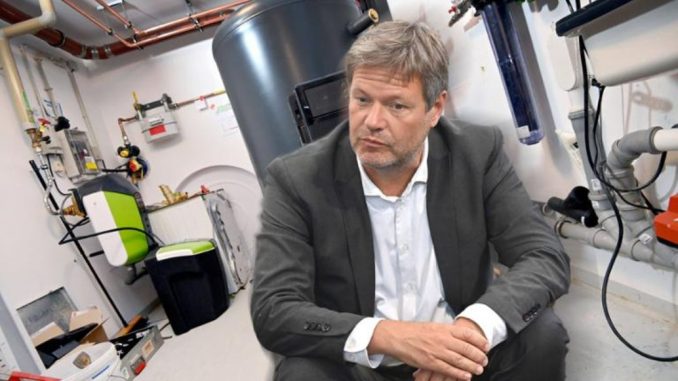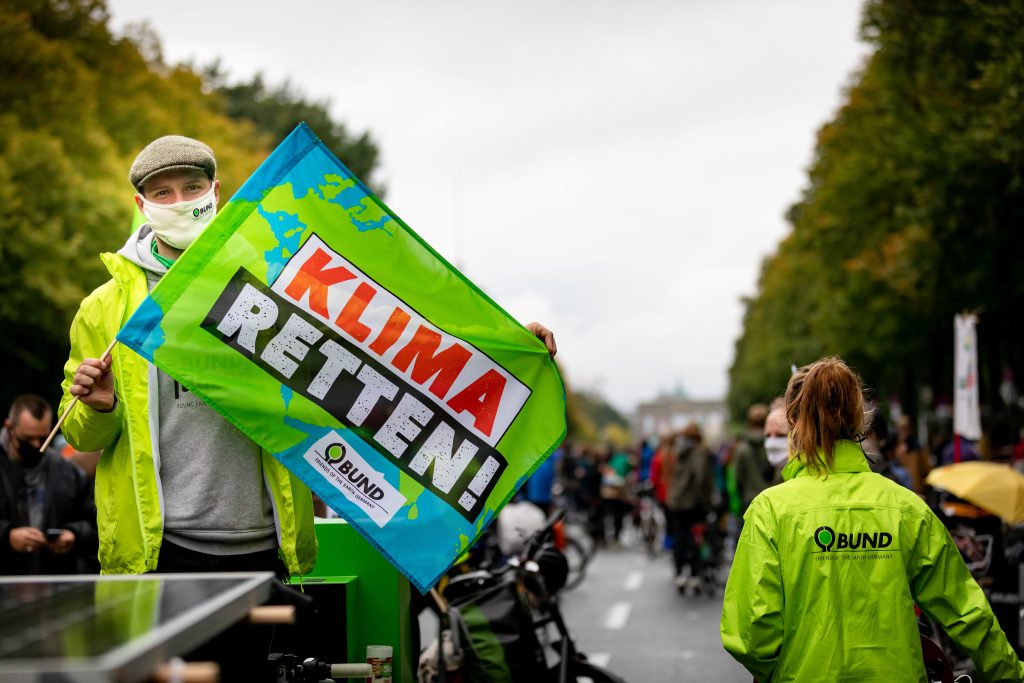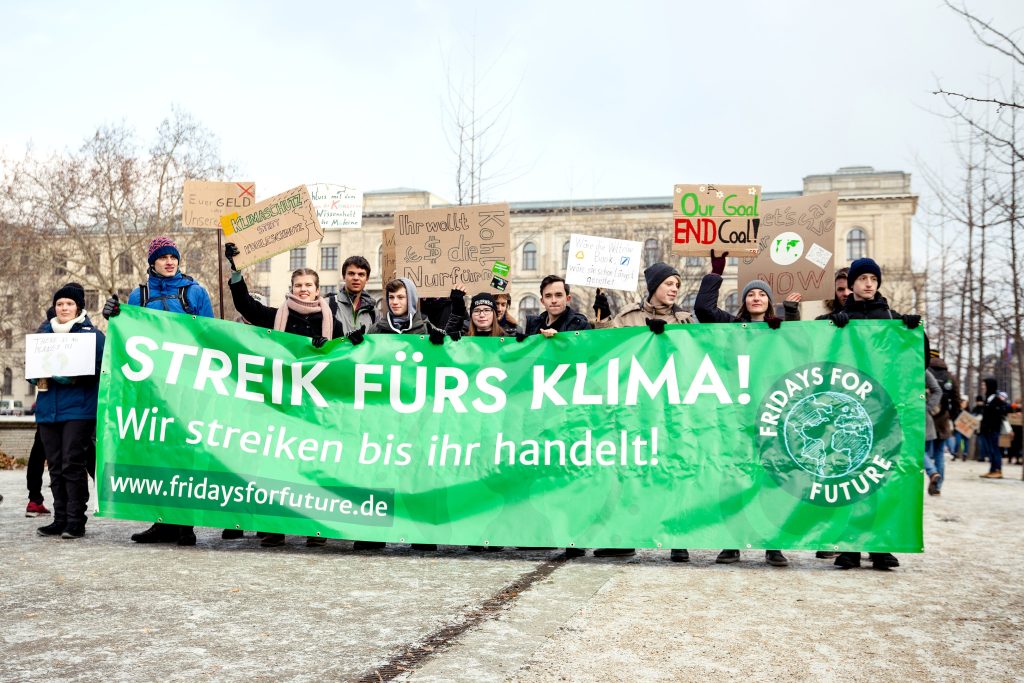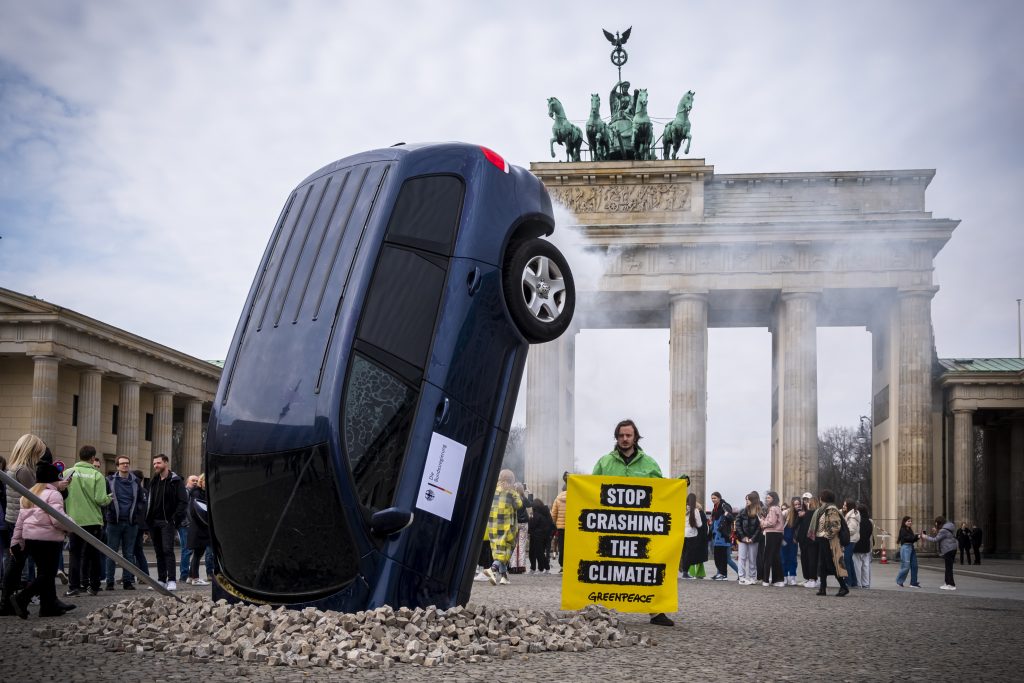
The government is promoting a new incentive framework for companies to invest in energy efficiency and approved the heating law so that new building installations are based on renewable energy. But its environmental direction is misleading. The liberal wing clings to combustion engines and the dream of electronic fuels (e-fuels) currently under debate, discontent continues with its transportation policy, and it has not been able to reduce CO₂ emissions as expected. Our alternative proposals.
By Carolina Menéndez Trucco
The “green heart” of Europe has a severe arrhythmia. Especially in its forests, so essential to protect the climate and biodiversity. Floods, forest fires, extreme droughts and storms, among other factors, wreak havoc. According to experts, half a million hectares of forest will be lost in the coming years. The rest of the ecological panorama is not encouraging at all.
Germany is responsible for a whopping 5.37% of global CO₂ emissions, while today the European Union emits as many greenhouse gases per capita as China, the world’s largest emitter. People around the world are suffering from the destruction of their environments and instead of taking the necessary measures in the face of the crisis, power and unscrupulous businesses take wrong turns. In such a scenario, the big question is how to move forward.
For decades, researchers have warned about the consequences of climate change that are now visible in every corner of the earth. The environmental tragedy is undoubtedly political. The course of capitalism is towards an imminent social and ecological collapse, in addition to wars and other scourges. The dominant sectors of the imperialist countries have always been aware of this and today the problem explodes. Therefore, more than this or that restriction or partial and insufficient regulation, a fundamental change is needed in the entire energy, productive and capitalist consumption matrix.
It rains and it doesn’t rain
The logic of good judgement. Where is it? Germany, Europe’s economic engine, is presumed to be a pioneer in the field of renewable energy. But in the face of ecological urgency, more concerned about its stagflation, it continues to allow investments that are harmful to the climate, disguises agreements with corporations and recently passed the Growth Opportunities Act to encourage more production by medium and small companies.
The capitalist power struggle is perpetuated behind the backs of society and at the expense of nature. Regarding budget priorities, as in previous cabinet debates, Social Democratic Chancellor Olaf Scholz (SPD) fell between the liberals and the environmentalists. The liberal Finance Minister, Christian Lindner (FDP), questioned the objections of the Green party in the hands of the Minister for Family, Senior Citizens, Women and Youth, Lisa Paus (Bündnis 90/Die Grünen) by prioritising investment in children over in companies. But the confrontation and lack of common sense are no longer surprising. More than once the positions have been incompatible. All in all, the parliament (Bundestag) approved the tax reduction bill.
One of the purposes of this law is to encourage companies to invest in climate protection, offering them tax advantages in return. But it does not affect the greenwashing of so many organisations that spend more time and money on marketing than on actually minimising their environmental impact. Furthermore, in return, it entails a severe social adjustment: from cuts to basic child and unemployed security to the dismantling of immigration advice centres. That is, the most vulnerable sectors pay for it.
The German “even-handed” bias or false balance, like an hourglass, seems to be running out. The traffic light[1] government is neither decisive nor impartial, the social headwind increases and time is pressing. As Lenin rightly stated in One-Step Forward, Two Steps Back, efforts are of no use if coherence is not maintained and the circumstances that lead to contradiction and division are not examined. The fact is that any environmental “transition” tied to reorganising the capitalist-imperialist economic logic is a vicious circle.


For good and bad
A hint of good sense in the program. Robert Habeck sitting in the boiler room. Like this, the Vice Chancellor of Germany and Federal Minister for Economic Affairs and Climate Action of the Scholz Cabinet was seen. The new Buildings Energy Act (GEG), also colloquially known as the Heating Law, promoted by said minister, is part of the debate on new regulations to save energy in buildings. Although the direct obligation to use heat pumps was lifted, from 2024 every new heating system must operate with 65% renewable energy. That is, gas or diesel heating can no longer be installed.
You could say that this is one of the government’s main climate-friendly projects, since the share of green energy in the German heating and cooling system is only 17.4%. 80% of homes today are heated using fossil fuels. Even so, it is still not clear who will bear the costs, how much will fall into the hands of the State, whether it will be the owners who will assume half or whether the matter will end up falling on the tenants through a rent increase.
Energy transition under the magnifying glass
The government does not act logically or consistently. The plan to reduce emissions from the construction sector by 42% by 2030 casts doubt on whether this can work with new heating installations alone. In addition, the ruling party and the opposition also diverge on other issues, while the extreme right directly denies climate change. There are also differences in the transport issue, the second sector that emits greenhouse gases after electricity generation: only 6.8% of it participates in renewable energy.
On the other hand, because of extractivism, there are completely squeezed areas such as the town of Lützerath where the lignite excavators from the mine have almost completely displaced the population: today only three people remain. According to the climate movement Fridays for Future, the ruling tripartite coalition in Germany promotes environmentally harmful investments, more fossil gas and acts as if climate protection would exacerbate social conflicts when in reality ecological and social justice go hand in hand. The fact that the federal government now wants to postpone without a deadline the introduction of climate money, social aid to relieve poor people in the face of the increase in the price of CO₂, hinders this supposed fair redistribution. By the way, FfF called for a global strike on September 15.
Eco-social reaction
In addition to a group of activists spraying the Federal Ministry for Digital and Transport with liquids, a Greenpeace protest also made itself felt a couple of months ago: they symbolically crashed an SUV (sports utility vehicle) car to the ground in front of the Brandenburg Gate in rejection to the ministerial decision to block the ban on cars with internal combustion engines promoted by the European Union. On Pariser Platz, it looked as if an all-terrain had been rammed into the ground.
The action targeted the promotion of electric, hydrogen and new generation fuel vehicles. Germany is the largest manufacturer of traditional vehicles in the EU and one of the largest in the world. Therefore, it wants to apply mandatory registration of electric cars only from 2035. In the federal government, the liberal FDP is pushing to delay the exclusive sale of zero-emission vehicles, resist the disappearance of internal combustion cars, and to maintain its use, it proposes synthetic fuel, which is less polluting, as a “solution”.
Green alternative?
Finally, what is the problem with e-fuels? These synthetic fuels are cleaner and compatible with some of today’s cars. Even so, the fight against environmental pollution has other aspects. The relative environmental advantage of this type of fuel is not without problems: they continue to pollute in their post-combustion, they are complex, inefficient, expensive and require renewable energy for their production.
No more fossil fuels like petrol or diesel. For many, the most efficient alternative is the electric car. But to justify this false “green transition” they omit that the lithium necessary for such batteries comes from growing extractivism in peripheral countries, such as the Chile-Argentina-Bolivia triangle.
Furthermore, green fuel continues to be a distraction and an excuse to pardon combustion cars. Even so, the Minister of Finance insists on its “benefits”, so that e-fuels will have lower taxes or be almost free, just like cars that run on them. It is no coincidence that a boom is then expected for them, but also for the German automotive industry, one of the richest, which is now betting on electronic fuels to preserve its businesses.

Red alert
The incompatibility of positions can lead to a permanent contradiction. On an environmental level, Germany remains stagnant. To avoid massive damage, it says it wants to achieve climate neutrality in 2045, but to do so it would require tripling the rate of reduction of CO₂ emissions, and it does not act to achieve it. For the moment, the capital has not been able to set stricter objectives. “Berlin 2030 Climate Neutral” was a referendum voted last March on a new law that required the Senate to reduce harmful emissions by 95% by that date and to do so in a socially fair way, compensating for higher net rents. But the project failed: very few Berliners voted in favour.
At the same time, reports indicate that the country is far from achieving its nature and climate goals. Per person emissions continue to be among the highest, mainly due to industry’s share and the large contribution of electricity and heat production.
Eco-socialist Action Plan
Despite the effects of the crisis and certain tentative measures, there is no sustainable and operational transition model without proposing a comprehensive revolutionary change. Starting with the planning of production and the management of the entire industrial range based on social needs and not business profit. Well, the current model of capitalist accumulation has only caused greater social inequality and disasters. The Germans know it well.
Due to the energy crisis and the possible interruption of the supply of Russian gas, at the time the German government did not hesitate to consider intervening in the energy market, in energy prices, and, therefore, in the industry. But the turning point in this sector did not end with the pandemic, much less with the subsequent contraction of the economy. Now large-scale production is being promoted again at the expense of the socio-environmental. Therefore, a true transition to reduce pollution must include measures as part of an alternative anti-capitalist economic plan, even with a European and international projection:
- That the heating law is not limited to real estate and residential property, but includes industry, commerce, services and new and old heating systems. Implementation of energy exchange systems to use waste heat from all sectors.
- Reduce the number of private vehicles, expanding public transport networks, in the hands of the State and under social control, with conversion to renewable energy.
- Replace the fossil fuel matrix with one based on renewable and clean energy, including the reconversion of current workers in the sector and preserving their rights.
- Reforest all damaged areas, adapting them to long-term climate change. Environmental remediation at the expense of the corporations responsible for the damage.
- Zero extractivism. Common goods must be an inalienable social heritage. We understand its use within the framework of a productive plan at the service of working people, re-educating mass consumption based on other cultural parameters and with respect for the ecosystem.
Although Germany appears to be a global example in terms of renewable energy and its implementation, its climate policy is full of inconsistencies. Only a workers’ government will be able to advance consistently in genuinely democratic, supportive and ecological economic planning. From the ISL and in each country, we work towards these objectives.
[1] It alludes to the colours of the Social Democratic Party, the Free Democratic Party and the Alliance 90/The Greens, that is red, yellow and green respectively.








